
Image courtesy of Medtronic
January 30, 2015 — Medtronic announced new results from the PainFree SST and Shock-Less clinical studies published in the journal HeartRhythm. The data show that treating patients with Medtronic implantable cardiac devices equipped with SmartShock Technology, and that providing clinicians with proactive reports, help physicians deliver life saving therapy while avoiding inappropriate and unnecessary shocks.
The studies evaluated cardiac resynchronization therapy-defibrillators (CRT-Ds) and implantable cardioverter defibrillators (ICDs), which stop life-threatening fast or irregular heartbeats by shocking or pacing the heart. While most ICD-delivered shocks are needed, previous studies estimated that approximately 20 percent of patients with ICDs may experience inappropriate shocks in response to benign arrhythmias or electrical noises sensed by their devices.
The new PainFree SST study results show that the rate of inappropriate shocks for patients with the Medtronic SmartShock Technology was 1.5 percent with a dual/triple chamber defibrillator and 2.5 percent for single chamber ICD at one year after implant. At two years post-implant, 2.8 percent of dual/triple chamber and 3.7 percent of single chamber device patients experienced inappropriate shocks.
These results are consistent with earlier findings that showed 98 percent of patients with SmartShock technology are inappropriate shock-free at one year.
While PainFree SST data show the benefits of SmartShock Technology, the results from the Shock-Less clinical study demonstrate the importance of programming devices to improve "real world" patient outcomes. Most implanted ICDs are programmed to the manufacturer's default settings; however, the Shock-Less study showed that patients had better outcomes when their clinicians received guideline-based programming recommendations and periodic programming compliance reports prior to ICD implants.
Patients who received ICD implants after their clinicians received these reports were up to 20 percent more likely to have their ICDs programmed according to guidelines, and to have a lower risk of inappropriate shocks. Based upon the results of these studies, Medtronic modified the initial settings of its ICDs, thereby simplifying programming for physicians and optimizing outcomes for patients.
In addition to providing better patient care, previous studies have shown that preventing inappropriate shocks also can lower the rate of hospitalizations, resulting in cost savings (Medtronic ADVANCE III Trial).
PainFree SST is a prospective, multicenter study that enrolled 2,790 patients at 126 centers across the globe, all of whom received a new device implant, system upgrade or generator replacement. Patients were followed for up to four years, with visits every six months.
Shock-Less is a prospective clinical study that enrolled 4,131 primary- and secondary-prevention patients with ICDs between 2009 and 2012 at 118 clinical sites. After first enrollments in the trial, clinicians received reports that displayed ICD parameter settings in relation to evidence-based targets (including number of intervals to detect Ventricular Fibrillation (VF), longest treatment interval, supraventricular tachycardia (SVT) discriminators, Lead Integrity Alert(TM) and anti-tachycardia pacing).
For more information: www.medtronic.com


 January 05, 2026
January 05, 2026 









